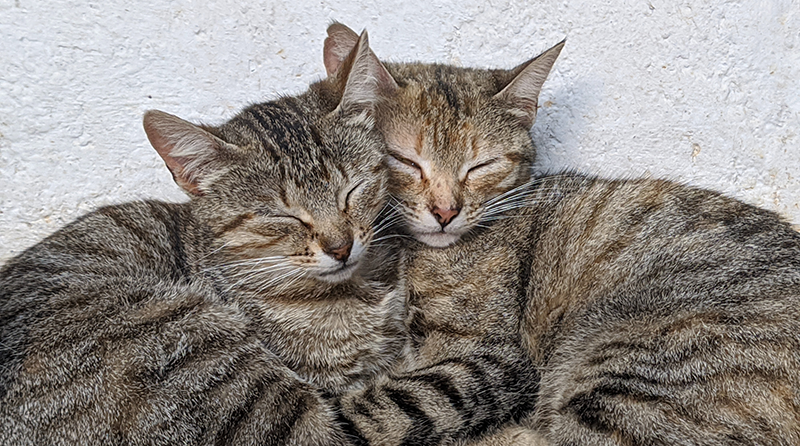Cancer in Cats: 4 Most Common Types

Pet Cancer Awareness Month In May
During Pet Health Month, our Focus on Cats listed the top 10 reasons cats visit the veterinarian. Fortunately, cancer in cats is not in the top 10, but there is still much to know about this diagnosis.
Common Cancer in Cats
It’s important to note that cancer is more likely in older cats. The American Animal Hospital Association describes four common cancers in cats:
- Lymphoma: Located commonly in the thymus, gastrointestinal tract, liver, spleen, and renal system
- Mammary gland cancer: Mammary gland
- Squamous cell carcinoma: Oral (mouth) or cutaneous (skin)
- Soft-tissue sarcomas: Cutaneous and subcutaneous tissue, injection sites

Symptoms of Cancer in Cats
Symptoms of cancer will vary with the type of cancer, and many individual symptoms can also indicate a different type of ailment. PetMD lists many symptoms to look for. Veterinarians at Grady Veterinary Hospital understand that you know your cat best and are an important advocate for your pet’s health. Make sure to tell your veterinarian if you have noticed anything amiss or different about your cat.
Feline Lymphoma Symptoms
- Unexpected weight loss
- Vomiting
- Refusing to eat
- Diarrhea
Mammary Gland Cancer Symptoms
- Masses you can feel under the skin, in the area of the stomach
- Area will be warm to the touch and may be painful
Squamous Cell Carcinoma Symptoms
- Difficulty eating
- Discomfort
- Bad breath
- Unexpected weight loss
- Excessive drooling
- Swelling in the jaw
- Bleeding from the mouth
Soft-Tissue Sarcoma Symptoms
- A mass or lump you can feel
- Limping or lameness
- Vomiting
- Trouble with urination
How Veterinarians Diagnose Cancer in Cats
Veterinarians use many diagnostic tools to diagnose cancer in cats, as described by Grady Vet’s Veterinary Internal Medicine experts. Our team may recommend:
- Blood work
- Digital radiography
- Ultrasound
- Endoscopy
- Aspiration or biopsy
After diagnosis, your veterinarian will recommend various treatment options. These depend on the kind of cancer, stage, your cat’s age and other factors. For PetMD, Dr. Joshua Lachowicz, DVM, DACVIM (Oncology) added:
“Cats tend to do very well with treatment across the board. They recover nicely from surgery if it’s a surgical case. With radiation, the side effects in cats are much less severe in most cases. In chemotherapy they have mild side effects—90% of the time, they’re going to have minimal-to-no side effects, and in the cases that they do have side effects, they’re going to be mild. The ones that are going to be moderate are less than 10%”
Reducing the Risk of Cancer in Cats
As your cats ages, the risk of cancer increases. Annual or semiannual wellness visits can help spot illnesses (including cancer) in their early stages. Here are some other risk factors that you can control:
- Feed your cat a nutritious diet
- Promote exercise with toys and enrichment
- Provide a low-stress environment
- Avoid second-hand smoke
- Reach out to your veterinarian if you notice any troubling or unusual symptoms
Visit our Cat Health Resources for more guidance on caring for your cat. And follow us on Facebook for pet tips, contests and fun.

